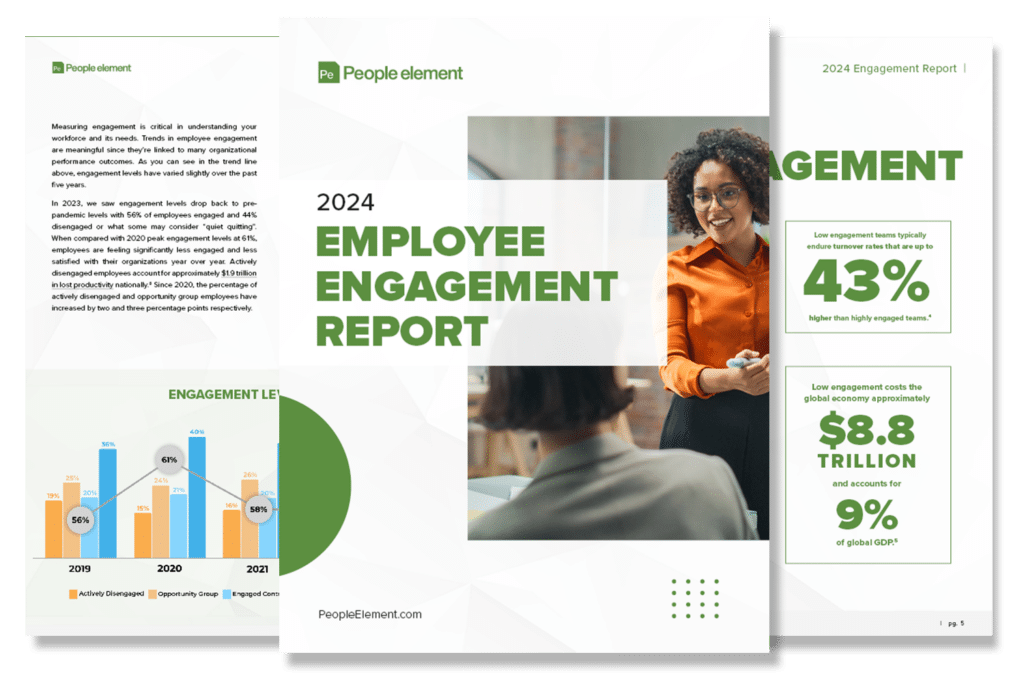Lately, Human Capital Management, or HCM has become a buzzworthy piece of HR—and for good reason. In the simplest terms, human capital management is how an organization supports and manages its people through the full employee journey. This journey begins with recruitment and flows through to when an employee leaves the company (and starts back again if the person is rehired). It’s no surprise that HCM is getting more attention as workplaces realize that their people are vital and a key component to their success.
With this in mind, there are a ton of moving parts to consider when planning out your HCM strategy, from onboarding processes, employee engagement, to recognition and everything in between. For most, it can be difficult to know where to start. We all know that there are best practices and commonalities across all workplaces, so you can definitely start with those. What will be most valuable is drilling down into what elements matter most to your team specifically and building your HCM strategy around that.
HCM – Narrowing Your Focus
At this point, HCM covers just about everything HR-related. If you want to implement some processes and initiatives that will actually make a difference, you’ll need to narrow your focus and take it piece by piece. For example, some workplaces might have a heavy focus on compensation and benefits whereas others might weigh flexible scheduling more heavily. The point is, it is hard to be good at everything, and even harder to get the budget needed to support everything. So, what matters most to your team? And don’t just make assumptions, what really matters according to them?
If you don’t have an answer to that question, that’s okay—most people don’t. So, when you don’t know something, what should you do? Ask! Exactly. The answer isn’t going to come out of thin air or come to you miraculously in a dream—you need to be the catalyst for figuring it out. Fortunately, it doesn’t need to be a hard and grueling process. Most of the time, people are ready and willing to tell you their preferences, you just need to ask them to find out.
How to Ask Employees for Feedback
Asking for feedback can actually be very streamlined and doesn’t need to take much time and energy. Whether you have 100 employees or 100,000, you can scale your feedback efforts to work for you. One of the most efficient ways to gather feedback from the majority of your people is through companywide surveys. When we say surveys, we aren’t talking about old paper surveys that people fill out by hand (although you could do that but it would be very inefficient). We are talking about modern online surveys that can be completed from any computer or mobile device so that you can hear from as many people as possible.
Employee surveys are a great avenue to get real thoughts from your team that they likely wouldn’t have the opportunity to share otherwise. It wouldn’t be possible to sit down and have a check-in meeting with each and every employee and document their preferences without taking up a huge chunk of your time. Even if you did do that, chances are that they would hesitate to share candid suggestions or opinions because of the face-to-face environment. Imagine writing an online Yelp review versus sitting face-to-face with the owner and sharing what you thought. One feels much easier than the other! With surveys, you can oftentimes get better and more thorough responses because they have the ability to answer at their own pace, and they don’t feel the pressure to answer in a certain way because you are right in front of them.
The process for surveys is fairly simple, you can put together a set of questions, send your survey link to your team, and immediately start collecting responses. These responses are truly worth their weight in gold because now you can analyze the data, look for trends, and have tangible data to tell you where to focus your HCM strategy. We won’t get too into the weeds on survey strategy but if you want a deep dive on the topic, you can find it here.

Human Capital Management Questions to Ask
Let’s focus now on what type of survey questions you can ask to get the most insightful data for your human capital management efforts. If you have no idea where to begin, consider a ranking-style question where you provide a list of HCM categories (benefits, recognition, compensation, flexibility, communication, etc.) and ask your team to rank them in order of importance. You’d be surprised how often compensation/pay is not number one on that list. As a follow-up question, you could use an open-ended question to ask why they picked their top choice and encourage them to be as specific as possible.
You can take an alternate question route if you already know what categories matter most to your team and focus on drilling down into each one. For example, if you know that your team really prioritizes the importance of recognition in the workplace, you can ask questions that can narrow that category even further. You can ask them to rate current recognition efforts and select which pieces are making the biggest difference for them, and alternatively what you could do differently. Get specific with the questions so that you can really understand what areas are working and which need improvement. If you have some potential initiatives in mind but want to see which ones they prefer, list out the top 3 options and ask them to pick which one would make the biggest positive impact for them.
Survey Question Examples
Below are a few more specific question examples that could be answered on a 5-point Likert Scale of agreement (strongly disagree, disagree, somewhat agree/disagree, agree, strongly agree).
Flexibility
- My schedule allows me to maintain a good work/life balance
- My schedule is flexible enough to meet my needs
Mental Health / Wellbeing
- I am satisfied with the mental health and safety practices of my company
- I have the resources and support I need to effectively manage my stress
Hybrid Work
- How can the company better support your ability to work from home? (open-ended question)
- I am able to work from home when I need to
Communication
- The company’s communication tools are useful (i.e. newsletters, bulletin boards, emails, etc.)
- I am satisfied with the communication in my department
How to Get Started with Employee Surveys
When you are ready to start using company surveys to make data-driven decisions for your human capital strategy, here’s how you get started. Depending on the size of your organization, you’ll likely want to use a survey software or solution that can give you the functionality you are looking for and can handle your workforce. Even if you have a small team, you will want to avoid trying to DIY your surveys because it will just cause you more of a headache in the future when it comes to analyzing your results.
Here are a few things to consider and look for in a survey provider:
- Do they offer survey templates and question libraries or will you need to build surveys from scratch?
- Is the survey mobile-friendly, i.e. can it be completed from a cell phone or other mobile device or just on a computer?
- How can survey invites be sent (email, text message/SMS, etc.)?
- What does the data and reporting look like? Does it help you analyze your data or does it just provide raw responses?
- Are there limitations on number of surveys that can be sent?
- What is the cost and how does it fit into your budget?
Once you are ready to take the next step, consider partnering with People Element for your company surveys. We’ve been in the business for over 30 years and specialize in surveys that cover the full employee journey. We have pre-built templates and a large question library that was built with organizational psychology in mind. We don’t stop at just giving you the tools to build the survey, we help you automate distribution, collect and analyze your data, and give you recommended areas of action. If you want to see how it all works and get a look into our survey platform, reach out to us for a quick discovery call today!





